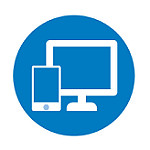
[Editors note: This guest post was written by Vicky Sargent, after the publication of a recent SOCITM Better Connected report]
A few months ago, the broadband to my home office got cut.
In a village that struggles with even 3G, and no coffee-shop-cum-wi-fi-spot to speak of, the library (open four half days a week) proved a real godsend.
Which was how I heard about the e-zines service available to library members. Yes, free online access to a whole range of popular magazine titles including – deal maker for me - The Economist. Downloadable to an app on my phone, too.
I hadn’t been a library member since the kids were small and hadn’t been planning to rejoin, with piles of unread Christmas and birthday books around the house and too little serious reading getting done. But the e-zines thing got me. I’m a heavy consumer of news online, and keen to diversify my sources without having to commit to lots of different subscriptions. Good for the library! I signed up right away and downloaded my first issue.
It wasn’t quite so easy the second time. I’d remembered to sign into my library account and the provider account but couldn’t quite remember the process. Ah – I did it, but not quite sure how..…
Third time, I tried looking at the instructions with the app. Gave up and read my husband’s paper copy. Fourth time, I resorted to the library’s (excellent) live chat service. ‘Is it just me?’ I asked. ‘A lot of our readers experience some difficulty when we introduce a new service’ responded the person on the other end, diplomatically.
Is it just me?
Because it really isn’t just me. The user experience with council library ‘e-resources’ is not good, according to Better Connected, the annual survey of local authority website performance.
Based on user testing of library services provided by England’s 27 county councils, Better Connected reported in January that council library services should be doing more to make it easier for people to sign up and use their e-books, e-magazines and e-audio services.
Library services online are already well used, accounting for around 8% of visits to council websites. But the provision of e-resources opens council library facilities to whole new audience segments, including those unable, or disinclined, to visit the library in person.
That council libraries are taking advantage of services made possible by digital technologies is great. But making these services easier to use will be critical if they are to fully exploit the opportunity.
Better Connected scorecard on library provision of e-resources
Fewer than half of the sites tested were assessed as providing a good or very good e-resources service. This compares with nearly three quarters that Better Connected assessed as being good or very good on the more straightforward Renew library book task reviewed last year.
The main failing was lack of good, clear explanations of how to use e-resources. Just 41% of sites scored a ‘Yes’ answer to the question Is the process for borrowing e-books clear including whether/how I need to 'return' ebooks. And fewer than 60% scored a ‘yes’ for the question Are there clear instructions on how to access and use e-resources?
Processes for borrowing e-books, e-magazines and e-audio resources are different and more complicated than traditional book borrowing. Readers will often need to download software or apps and will usually need to sign up for accounts with third party providers as well as having a library account with the council. Sometimes they will need to be signed in with both accounts at the same time in order to access resources.
Those managing library website pages need to recognise that, in this context, poor wording and the wrong hierarchy of information can make a huge difference to the user’s ability to access e-resources. Lack of attention to detail will lead users to give up or phone for further information. And all too often, councils fall back on the help pages presented by these providers rather than providing their own overview of how it all works.
Read the full report and sign up for the conference
Results of the library survey for the 27 county councils tested can be found from the Better Connected council index page. The ‘all council’ reports can be found by following links from the Better Connected website.
Better Connected Live 2017 will take place on June 28 and 29 in Birmingham. Further information is available at http://www.betterconnectedprogramme.co.uk/bclive-2017. Axial will be sponsoring the libraries workshop at BC Live, to be run in association with the Society of Chief Librarians.
----------------------------------------------
Please note, this is a guest blog. Views expressed here do not necessarily represent the views of DCMS or the Libraries Taskforce